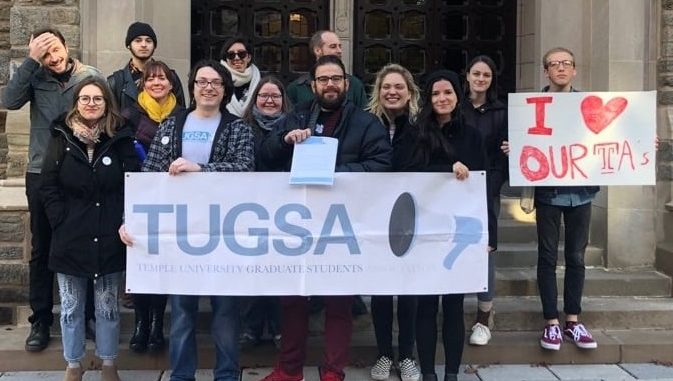
Dylan Lewis doesn’t feel he’s getting the same level of criticism and responses from professors about his scientific writing coursework.
“I have emailed my professors and have asked if we’re able to have a phone call to go over some stuff, and they either don’t answer me outright or say, ‘Yeah, sure I’ll get back to you later in the week’ and don’t end up responding,” said Lewis, a first-year master’s student.
After Temple switched to online classes beginning March 16 due to the COVID-19 outbreak, some graduate students are finding it difficult to resume the same level of coursework and teaching assistant responsibilities as during in-person classes.
Teaching assistants, or graduate students who assist professors in courses, had four days to transition to teaching online, and with no earlier notice from Temple’s administration, said John Hess, Temple University Graduate Students Association secretary and a third-year Ph.D. political science student.
TUGSA, a union representing around 800 Temple graduate employees, is managing concerns over teaching and research assistants’ worries about financial and travel situations, Hess added. These issues are mostly affecting graduate international students, whose visas restrict non-university-affiliated employment and who cannot get jobs or return home due to travel restrictions, Hess said.
The TUGSA executive board wrote an open letter to Temple’s administrators to ask for expanded health care coverage, a summer subsidy program that provides financial assistance for international graduate students’ salary in the summer, in addition to prorated refunds of student fees, lab and other course fees in light of the COVID-19 pandemic, according to the letter.
“Going into the summer, we expect this to be a big problem if it isn’t worked out because the economy’s shut down and nobody’s hiring,” Hess said. “If Temple doesn’t help our international students by providing them with income since they can’t go home, they are trapped here for three months without any kind of income, which is unacceptable.”
The university will continue to follow the terms of TUGSA’s collective bargaining agreement, said Ray Betzner, a spokesman for the university, in an email to The Temple News.
Hess is still optimistic that if TUGSA raises awareness of the needs of graduate employees, they can reach an agreement with Temple, he said.
In the meantime, TUGSA has compiled a list of health care, immigration services and online teaching resources during the pandemic.
Min Boo, a fourth-year english PhD student, teaching assistant and TUGSA’s sexual harassment officer, finds that not all students in her Analytical Reading and Writing class had a positive transition to online learning. Due to the lack of in-person interaction, she can’t really monitor how her students are progressing.
“Because I can’t see my students face-to-face, if someone’s not turning in their assignments, I have no way of checking in with them besides messaging or emailing them,” she said. “Some people will get back to me and some won’t, and I’m kind of worried if everything is OK with them.”
As an international student from South Korea, Boo doesn’t want to risk possibly contracting the virus by flying home. She had to apply for a remote freelance job in South Korea in order to support herself financially due to her not being able to work in the United States.
Currently, Boo is focused on teaching and her freelance translator job in the summer, but hopes she can return home at some point.
“It’s honestly very scary but I would want to go back,” she said. “I have good healthcare, but seeing how COVID-19 is being managed in this country, I’d prefer to get sick in Korea.”
Stephen Drehobl, who is also first-year PSM student in the scientific writing program, has had professors who’ve struggled with technical difficulties while trying to host virtual class meetings.
“We tried to use Google Hangouts, and that was working for a while but he’s looking to move to Zoom instead,” he said. “I think the main problem is that he needs to put on a pair of headphones so we won’t keep getting so much feedback, but it seems like we’ll be migrating to different places until he figures that out.”
One of Drehobl’s biggest adjustments has been trying to find quiet times and spaces to do his work since his entire family is now at home.
“Working from home is even more difficult now because everyone’s home,” he said. “It’s hard finding private time or sitting in a quiet room to work on a paper or a project.”


Be the first to comment